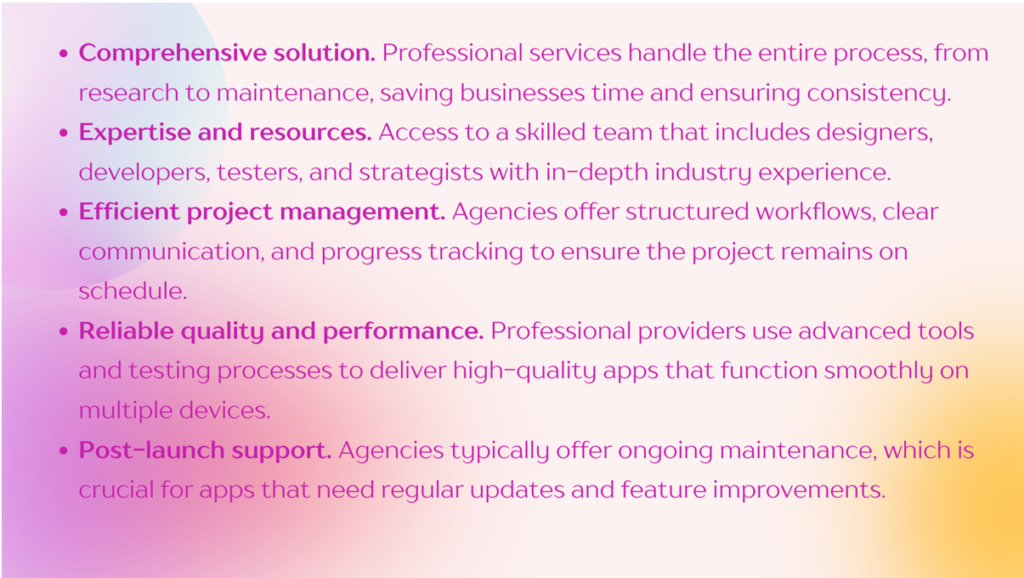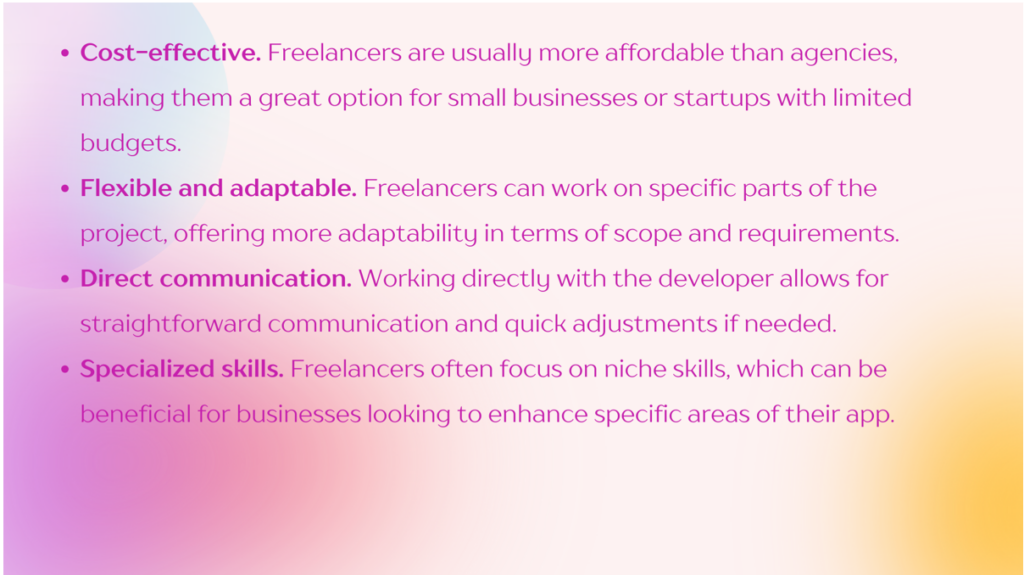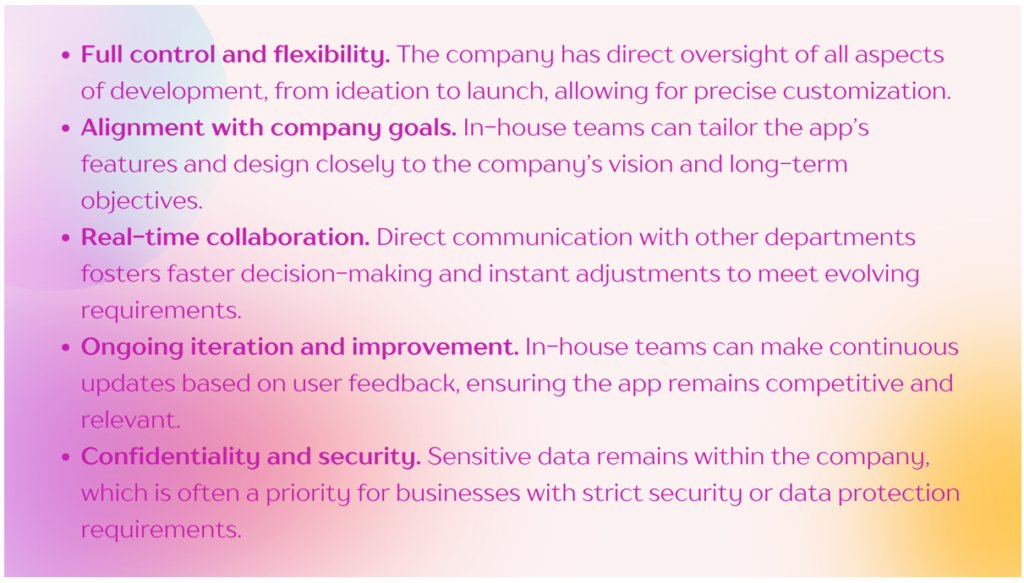Startups recognize that mobile applications drive customer engagement. However, developing a mobile app presents a significant challenge, especially for small businesses.
This guide explores the mobile app development journey. We’ve consulted the mobile application development service from Purrweb to equip you with the up-to-date information.
How to Find Your Perfect Mobile Development Services?
As a business, you have three main paths to consider:
- Hire professional mobile development services.
- Work with freelance mobile development services.
- Build an in-house development team.
Each option has its own unique strengths and challenges. Let’s dive into the first option, professional application development services, and break down the typical phases involved.
Professional Application Development Services
Professional application development services involve hiring a full-service agency. They offer experience, tools, and team members to carry out mobile app development.
| Phase | Description |
| Discovery and research | The agency conducts research on the target audience, competition, and market trends. |
| Strategy and planning | The team develops a detailed strategy. It includes project timelines, cost estimates, and goal-setting. |
| UI/UX design | A dedicated design team works on the user interface and user experience. |
| Development | Experienced developers code the app. They ensure compatibility across platforms and integrate features such as APIs and databases. |
| Testing and quality assurance | The app undergoes rigorous testing to identify and fix bugs. |
| Deployment and launch | The app is launched on relevant app stores. The agency manages technical requirements and guidelines for publication. |
| Ongoing maintenance and support | Agency provides support for updates and troubleshooting. |
Pros of professional application development services:

Freelance Mobile Development Services
Freelance mobile development services can be a cost-effective option. This is beneficial for businesses with smaller budgets.
| Phase | Description |
| Initial consultation | The freelancer discusses the app’s goals, basic requirements, and timeline with the client to understand the project scope. |
| Requirements gathering | Minimal documentation of app features and functionality, usually covering only the essentials needed to start development. |
| Basic UI/UX design | Freelancers may create a simple interface design, often without extensive user experience optimization, unless specialized designers are hired separately. |
| Development | The freelancer codes the core functionality of the app, focusing on essential features within the agreed budget and timeframe. |
| Testing | Limited testing is performed, typically by the freelancer themselves, focusing on basic functionality and identifying major bugs. |
| Deployment | The freelancer may assist with app store submission, but deployment support can vary widely depending on the freelancer’s expertise and scope of the contract. |
| Post-launch maintenance | Ongoing support is generally not included, but some freelancers offer limited post-launch support for additional fees or within an agreed-upon timeframe. |
Pros of freelance mobile development services:

In-House Mobile Application Development Services
An in-house mobile app development team allows a company to have full control over every aspect of the app’s development. This approach is typical for highly customized app needs.
| Phase | Description |
| Team assembly and onboarding | The company hires and trains a dedicated in-house team. The team includes developers, designers, and project managers. |
| Detailed requirements gathering | Extensive documentation of app features, user stories, and requirements. They are fully aligned with the company’s objectives and internal stakeholders’ needs. |
| Custom UI/UX design | The design team creates a fully customized user interface and experience, often with a focus on company branding and specific user needs. |
| Development | The in-house team codes the app, with the flexibility to build and refine features continuously according to real-time feedback from other departments. |
| Rigorous testing | Comprehensive and iterative testing across multiple phases (unit testing, integration testing, and user acceptance testing) to ensure high performance. |
| Controlled deployment | The app is launched with strict internal quality checks and compliance with app store guidelines, with the flexibility to modify launch schedules if needed. |
| Continuous maintenance and updates | The team provides regular updates and ongoing support. That keeps the app aligned with evolving company goals and user feedback. |
Pros of in-house mobile app development service:

How to Make the Best Choice?
The right app development approach depends primarily on your business objectives. Defining your goals clearly will help you identify the most suitable option because each type of mobile development service aligns with specific priorities and needs.
| Business Objective | Recommended Development Service | Reason |
| Rapid time-to-market | Professional mobile development services | Agencies have established workflows and resources to complete projects quickly and efficiently. |
| Budget-friendly solution | Freelance mobile development services | Freelancers generally offer lower-cost services suitable for MVPs or smaller projects. |
| High customization and brand alignment | In-house mobile app development service | In-house teams provide flexibility and are aligned with the company’s long-term brand vision. |
| Scalability and long-term maintenance | Professional mobile development services or in-house | Agencies offer maintenance packages, while in-house teams can continuously update and scale. |
| Specialized feature development | Freelance or in-house development | Freelancers offer niche expertise, while in-house teams allow for extensive customization. |
| Data security and confidentiality | In-house mobile app development service | In-house teams ensure that sensitive data remains within the company, enhancing security. |
The Bottom Line
Mobile application development is a significant step for any business. All you need to do is define your goals and evaluate your resources. All the rest will naturally align with your goals.


